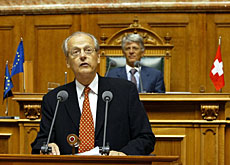Shaping human rights in Europe

Switzerland's Luzius Wildhaber has been president of the European Court of Human Rights since 1998.
swissinfo caught up with him this week in Bern where he joined in celebrations marking 40 years of Swiss membership of the Council of Europe.
Wildhaber first joined the court, based in the French city of Strasbourg, in 1991, when it was still functioning on a part-time basis.
He told swissinfo that the court had played an important part in shaping human rights policies in each of its member countries since it was set up in 1959.
swissinfo: In what ways has the European Court of Human Rights been a success?
Luzius Wildhaber: It has made human rights a reality in a good many member states. It has done that by reaching out to those member countries where the protection of human rights is still fragile.
To a certain extent it has become a European Constitutional Court of some sort – not in every respect but in terms of trying to sell standards across Europe that should become part of the common heritage.
The court’s work provides an excellent way of keeping a society peaceful, pluralistic, tolerant and open. It’s a very good way of changing the outlook and the perspective on internal and international conflicts.
swissinfo: The court received around 38,000 cases in the last year. How do you decide which ones to pursue?
L.W.: The selection process constitutes a huge amount of our work. We declared 92 per cent of these cases inadmissible because the applications came to late, or they concerned facts prior to the ratification of the convention by the country in question, or because the application was manifestly ill-founded.
The variety of cases submitted is enormous. They can include complaints about a fine inflicted on a journalist, for example, or violations of rights in respect to family life because a person hasn’t got access to children after a divorce.
swissinfo: How does Switzerland fare on the human rights level?
L.W.: The reality is that most of the countries in western and central Europe are doing reasonably, but there is no state that has never had a case against it – and I would be very much worried if there were no cases against Switzerland.
If that were the case, it could imply people are not informed about the possibility of going to the court or that the government is actively discouraging them from coming to our court.
swissinfo: Which are the countries at the moment that are of most concern to the court?
L.W.: Well you can look at it in two ways. You can have the countries that have the highest number of cases – last year that was Russia, Turkey, Poland, Romania, the Ukraine, France, Italy and Germany – in that order.
Then you can take the number of cases and look at these in relation to the total population in a given country. And there it is quite clear that central Europe would top the list – last year it was Croatia, Slovenia, Slovakia and Bulgaria.
swissinfo: Why did you choose to go into human rights in the first place?
L.W.: I was born before the Second World War, so obviously that had an impact in the way I thought – about prevention of conflict, the wartime atrocities and what could be done about that.
When I was at university, I may have had the first seminar anywhere in the world about protecting human rights in international law. This was a lecture in 1964 at Yale law school by Egon Schwelb, who was subsequently instrumental in building up the United Nations human rights instruments.
I came back to Switzerland and I shared in the experience of writing the government’s reports on the European Convention on Human Rights in 1968. My academic career began with my lecturing on whether the European Convention would have constitutional rank. So I have always been interested in the topic.
swissinfo: What would you like to be remembered for having achieved and what comes afterwards?
L.W.: I would like to be remembered for building up a consistent body of human rights case law that would have made its way into as many domestic legal systems as possible.
For the moment my ambition is to do my job well. Afterwards we’ll see.
I don’t think I’ll go back to lecturing as a professor in Switzerland as I did before.
If I am asked to lecture anywhere, I think I would rather go to central and eastern Europe where my help would be needed a lot more than it is here.
But I might get special mandates – that’s perfectly possible after I step down. I also want to write something about my life and the history of the court and that’ll keep me quite busy.
swissinfo-interview: Jonathan Summerton
The European Court of Human Rights was set up in 1959 by the Council of Europe.
It became a full-time court in 1998.
Every Council of Europe member state appoints a representative to serve as a judge.
The court received about 38,000 cases in the last year, but about 92 per cent of them were inadmissible.

In compliance with the JTI standards
More: SWI swissinfo.ch certified by the Journalism Trust Initiative









You can find an overview of ongoing debates with our journalists here . Please join us!
If you want to start a conversation about a topic raised in this article or want to report factual errors, email us at english@swissinfo.ch.